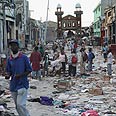
Haiti sees 200,000 dead, fears violence
Varying estimations regarding quake death toll; gangs starting to take to street, minister says
As many as 200,000 people died in the earthquake that devastated Haiti and three-quarters of the capital, Port-au-Prince, will need to be rebuilt, authorities in the Caribbean country said on Friday.
"We have already collected around 50,000 dead bodies. We anticipate there will be between 100,000 and 200,000 dead in total, although we will never know the exact number," Interior Minister Paul Antoine Bien-Aime told Reuters.
Some 40,000 bodies had been buried in mass graves, said Secretary of State for Public Safety Aramick Louis.
Aramick Louis, secretary of state for public safety, also said gangs were starting to take to the streets and the government's main fear was a surge in violence.
Meanwhile, UN Secretary-General Ban Ki-moon says up to 50 percent of the buildings in Haiti's capital and other areas hardest hit by the earthquake have been damaged or destroyed.
The UN chief says the United Nations will launch an emergency appeal later Friday for $550 million to provide food, water, shelter and other essentials for millions of Haitians.
If the casualty figures turn out to be accurate, the 7.0 magnitude quake that hit impoverished Haiti on Tuesday would be one of the 10 deadliest earthquakes ever recorded.
Looters have broken into UN food warehouses in Haiti's crumbled capital, an official said Friday, as security and logistical challenges mounted for groups trying to feed at least two million people reeling from the devastating earthquake.
The UN World Food Program stressed that looting was normal in emergency situations, but spokeswoman Emilia Casella said the agency didn't know how much remained of its pre-quake stockpile of 15,000 tons of food aid in Port-au-Prince.
She noted that regular food stores in the capital also "have been cleaned out" by desperate Haitians since Tuesday's 7.0-magnitude earthquake killed thousands and left countless more buried under the rubble.
'Physical destruction is great'
Distributing food and clean water to hungry and thirsty quake survivors is the top challenge of the early relief effort. Looting, bad roads, a ruined port, an overwhelmed Port-au-Prince airport and fears of violence meant most Haitians have received no help three days after the quake.
"The physical destruction is so great that physically getting from point A to B with the supplies is not an easy task," Casella told a news conference. "Pictures can get out instantly ... and that's important because the world needs to know. But getting physically tons and tons of equipment and food and water is not as instant as Twitter or Skype or 24-hour television news."
The international community has already donated hundreds of millions of dollars and sent in the first of hundreds of doctors, engineers, soldiers and aid workers.
But the UN and others still hadn't figured out how to deliver assistance through broken roads and crumpled buildings, with little machinery to clear the mess. They are also contending with masses of people gathered in Port-au-Prince's streets, few working phones and a massive influx of goods and personnel without an organized plan.
Casella said her agency was working to collect enough ready-to-eat meals to feed 2 million Haitians for a month.










